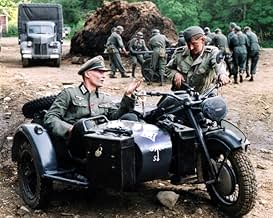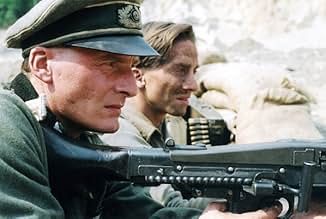Añade un argumento en tu idiomaSet in Northern Italy during the last embers of the war, the beleaguered vanguard of Axis forces suffer daily bombings and the constant threat of attack from local partisans. Tempers begin t... Leer todoSet in Northern Italy during the last embers of the war, the beleaguered vanguard of Axis forces suffer daily bombings and the constant threat of attack from local partisans. Tempers begin to flare between these 'allies' as they await their impending doom.Set in Northern Italy during the last embers of the war, the beleaguered vanguard of Axis forces suffer daily bombings and the constant threat of attack from local partisans. Tempers begin to flare between these 'allies' as they await their impending doom.
Reseñas destacadas
"Last Letters from Stalingrad", the 1950 compilation of the supposedly authentic war letters of Nazi soldiers caught in the bloodiest WW2 battle, has become the primary source of inspiration for the unprecedented war epic portraying the last days of WWII fighting in Italy - "The Fallen" and its second part "The Last Letters of Monte Rosa". Authenticity, viewed here as a meticulous, accurate re-enactment of the historical details - battleground weapons from period rifles to tanks and planes, soldiers' uniforms, etc - is more than sufficient condition for the compassionate and intimate presentation of the war daily routine with its sudden changes and upheavals, its cruelties and its rites. In this shoe-string budget production the up-and-coming filmmaker Ari Taub brings fear, absurdity and humor (all related to everyday realities of war) - into their proper balance.
In "Letters" the enemy (the Allies) is not personified, and our attention is focused instead on the uneasy relations between the German infantry and the Italian troops mercilessly raided by the partisans. Hollywood storytelling conventions are inevitable for such a traditional narrative, shot at the same time with - but started even before - the late-nineties wave of WWII epic blockbusters like "Thin Red Line", "Saving Private Ryan" or "Ivo Jima". At the same time a certain theatricality of the everyday, certain comical twists of even the most sad episodes, a true indie spirit of his "Letters" has radically distinguish the film from the glitz and glamour of the "dream factory".
Almost as ambiguous as "Last Letters from Stalingrad", Taub's retro-version also does its best to show a "human document which bares the soul of the man at his worst hour". Moreover, due to its unique balance between the tragic and the comical it provides a true Aristotelean, cathartic release of the emotions, especially in the final scene of German martyrdom and their last photograph for the American magazine (hence for posterity).
After all, Ari might be short for Aristotle.
In "Letters" the enemy (the Allies) is not personified, and our attention is focused instead on the uneasy relations between the German infantry and the Italian troops mercilessly raided by the partisans. Hollywood storytelling conventions are inevitable for such a traditional narrative, shot at the same time with - but started even before - the late-nineties wave of WWII epic blockbusters like "Thin Red Line", "Saving Private Ryan" or "Ivo Jima". At the same time a certain theatricality of the everyday, certain comical twists of even the most sad episodes, a true indie spirit of his "Letters" has radically distinguish the film from the glitz and glamour of the "dream factory".
Almost as ambiguous as "Last Letters from Stalingrad", Taub's retro-version also does its best to show a "human document which bares the soul of the man at his worst hour". Moreover, due to its unique balance between the tragic and the comical it provides a true Aristotelean, cathartic release of the emotions, especially in the final scene of German martyrdom and their last photograph for the American magazine (hence for posterity).
After all, Ari might be short for Aristotle.
Letters from Monte Rosa is a solid addition to the WWII genre. It is told from the point of view of Italian and German soldiers, who, as men of enemy nations, have seldom been the central subject of films widely seen by American audiences. Only a few titles -- The Bridge, Stalingrad and Cross of Iron among them -- have ever gotten meaningful exposure to the same aficionados who have seen Saving Private Ryan and the many WWII big studio battle action films made in the 1960s and '70s. In those films, almost invariably, the Germans of the Wehrmacht were automatons with Schmeissers and Tiger tanks defending an evil regime, and too seldom given human dimension as men who also longed for home, family, safety, and days without fear and suffering. As their worlds collapsed and death chased them, each soldier had to decide and to prove if he was a coward or courageous, if he would seek escape or do his duty. Letters from Monte Rosa shows us the horror of war, that there is seldom any glory in the ugly business of killing or dying. Still, sardonic humor pervades several scenes, and a few good belly laughs ease the tension even while building it. Director Ari Taub directs the actors well, asking them to show us the charisma and frustration, leadership and anguish of men in situations where there is little hope of survival. Tech credits are very good: the camera moves crisply, a textured sound scape provides a real sense of place, editing is proficient and puts us in the action. Production design is excellent for a low-budget effort. Also commendable is that the film strives to avoid the clichés so common to the war genre, and in so doing reveals a great passion for the theme that even enemy soldiers had dignity and souls.
I was privileged to see this film at a small venue in Jupiter, FL called the Atlantic Theater. The only thing I had heard about this movie was that it was a WWII film told from the perspective of the Germans and Italians. It was funny at times, poignant at others. It wasn't an overtly grotesque viewing of war...it was told in moments between real people with real fears and needs. I literally would laugh one moment, then cry the next. The movie has subtitles, but the beauty of both languages, Italian and German, being spoken by the actors brought the audience into the reality of the lives of these characters. It is about love of your country, the pull of the glory of war combined with the exhaustion and degradation. The desperation as one realizes that it's not all it's cracked up to be, while realizing that it is the path you have chosen, good or bad. Never preachy, as some WWII films can be....from either side.
A great film with a talented cast,director and writers. More people need to see this...it will bring a perspective that has not been seen...ever to my knowledge.
A great film with a talented cast,director and writers. More people need to see this...it will bring a perspective that has not been seen...ever to my knowledge.
This film has all the quintessential elements a film should possess-a superb cast, an untold story delivered from a unique perspective, wonderful writing interspersed with moments both light and humorous as well as thought-provoking, and a wonderful director at its helm. It beautifully conveys the banality of everyday life for front-line troops combined with the sheer terror of modern warfare and enables the American viewer to empathize with an enemy fighter in a way that few war movies have done in the past. Although I was surprised by the high level of realism and technical detail achieved by the film, it was the relationship of the German and Italian soldiers, a relationship that has rarely been explored despite Hollywood's obvious fascination with the European theater, that truly carried the film. The tension-filled, yet often comical dynamic between the downtrodden soldiers of the two armies, seemingly fighting for dramatically divergent goals, fully captivated me, allowing me to forget that the American GI was little more than an afterthought in the film. A film that is particularly relevant for our times and should be viewed by all-highly recommended!
Excellent film...brilliant writing, and witty. Shows great feeling and judgement of the minds of the Italian and German soldiers. The costumes and showmanship of the actual wartime wardrobe was great! The scenes were serene and action packed. The film brought back my thoughts of this war. The director Ari Taub explained it in a different perspective which made it really interesting. I am not a wartime movie buff, but it was excellent. It peaked my interest. It is a must see in my book. I hope it gets out in the independent film festivals. It deserves it! I hope Ari Taub continues his great work and efforts to the film industry.
¿Sabías que...?
- CuriosidadesThis film was seven years in the making.
- ConexionesEdited from Días de sangre y fuego (2004)
Selecciones populares
Inicia sesión para calificar y añadir a tu lista para recibir recomendaciones personalizadas
Detalles
- Fecha de lanzamiento
- País de origen
- Sitio oficial
- Idiomas
- Títulos en diferentes países
- The Final Sacrifice
- Localizaciones del rodaje
- Empresas productoras
- Ver más compañías en los créditos en IMDbPro
Taquilla
- Presupuesto
- 300.000 US$ (estimación)
- Duración
- 1h 28min(88 min)
- Color
- Relación de aspecto
- 1.85 : 1
Contribuir a esta página
Sugerir un cambio o añadir el contenido que falta





















